#not when something like this makes so much sense narrative-wise
Explore tagged Tumblr posts
Text
i know i have talked about this already, but there is not much else to talk about at this point and i still can't get over how much ick s2's finale gives me when it comes to galadriel's storyline.
everyone except for sauron invalidated galadriel's trauma and treated her like a burden in s1, then they shamed and humiliated her in s2. and it all could have had a good narrative reason... if it hadn't led to a really sexist conclusion.
the whole narrative of the good guy who slut-shamed her "fixing" her, resulting in her putting down the sword and putting on the dress instead? yikes...
i love galadriel's characterization in trop. she is a perfect blend of feminine + masculine. saying this could get me crucified but i think she is much more queer-coded than sauron is; in a way that i can see her being nonbinary-coded. she is gender-nonconforming! she is abrasive and proud and a leader!
and this makes the insinuation of that ending all the more painful - from being this authentic, complex character to being... a tradwife to be.
she did not actually turn into a tradwife ofc. now that would be a real blasphemy against tolkien, lol. as galadriel was always a leader first and foremost, never defined as a wife/mother. but narratively, it felt like that was what happened.
some people will say that it's her transformation, that she must learn not to rely on her sword, yada yada. and sure, it can be a character development. BUT! in what direction? they have to be very careful with this direction if they don't want it to come off as a regressive and bio-essentialist "embrace your inner divine feminine, woman" conservative propaganda. it can be done if they lean into "the witch galadriel" arc.
and man, it's somewhat a similar case to killing eve. one reviewer of ke's finale said that women live their lives told to sit still, be accommodating, be self-sacrificial, and there comes a point in their lives where they have to decide if they are going to conform to all that even if it's inauthentic to who they are. villanelle recognized eve's darkness (which really was her authentic self) and wanted to nourish it. so the framing of eve "surviving" villanelle and being cleansed of her "darkness" felt wrong to many.
in many ways, that's how trop s2 finale felt to me. it's so interesting how haladriel's dynamic turned out subtextually. sauron saw galadriel's trauma, her darkness and yet he alone saw galadriel's greatness in her authenticity, and offered her authority - something that all others stripped her off of. yes, he stabbed her (and villanelle shot eve, btw), but told her that he would make her into an overlord of the universe at the same time, lmao.
worst of all, it doesn't make sense legendarium wise - galadriel is going to continue being a leader; yeah, she is not going to be as abrasive, but she will grow into a stone cold bitch (affectionate) instead; she is going to have a push-pull dynamic with sauron till he evaporates. so what was all that supposed to mean? i do believe they catered to the whiny "make galadriel tradwife again" crowd, and maybe inserted a mormon propaganda where it's the most misogynistic in its' message.
anyways, i still have my fingers crossed that they redeem the story direction in s3 by dismissing the undertones of s2 finale. or else it would really leave a sour taste in my mouth.
#haladriel#saurondriel#sauron x galadriel#the rings of power#rings of power#sauron#galadriel#trop#galadriel x halbrand#rop
48 notes
·
View notes
Text
Satoru Gojo and the Infinity That Sets Him Apart

Throught the flashback arc that opens JJK'S second season, the story goes to great lengths to make us sympathize with Geto. We are privy to the inner workings of his mind when he faces personal catastrophes of his youth, and it grants us a profound insight into how his mental/emotional state deteriorates in response to a painful realization that later comes to define his entire life. Gege found a way to turn Geto's tendency to internalize his experiences into a narrative tool, the mechanics of his Cursed Technique becoming an apt metaphor for it, and that's one truly astonishing writing.
But what about Gojo? After all, it's his memories that play out before our eye as he daydreams, and Geto is no longer an active force in the narrative, so the arc should be introduced in the first place to shed some light on Satoru's character and highlight certain aspects of it. However, while the narrative goes out of its way to humanize Geto by exposing his interiority to the audience, it seems to bit by bit deny readers access to Gojo's mind until Satoru is entirely closed off emotionally at the end of Hidden Inventory Arc. From that point on, any reading of his words and actions can be as good as the other since personal interpretation is all that is left to us to try and understand what lies behind the appearances (I guess that's precisely why there are so many widely different, conflicting interpretations of Gojo out there). What process Gojo's character undergoes throughout his past arc is, essentially, dehumanization.
Let's take a look at Gojo as he is in the main, present timeline. Pretty much as any other person in Gojo's vicinity, the audience can only observe him from the outside, always held at an arm's length away from his interior thoughts and emotions. Whenever we do get an insight into his mind, it's mostly for a solely practical purpose of keeping the readers informed about the direction which the fight is about to take, with Satoru's internal monologues consisting almost completely of him dryly strategizing against his opponents.
Even Gojo's design is set to dehumanize him, teasing the audience with how much it conceals and how little it allows us to derive from what we see. Plain black clothes, long sleeves, long trousers, high collar. Barely any skin exposed, scarce detail, completely colourless expression. To crown it all, his blindfold -- we do not get to see his eyes. Eyes mirror the soul, they communicate emotion which our words fail to. Eye contact is a primal tool of non-verbal communication because of how much our eyes alone can give away about our feelings. With Gojo's eyes perpetually hidden under his ever-present blindfold, there's an additional layer of protection, another hindrance to our understanding of his state of mind. A simple piece of cloth adds to the distance preventing access to Gojo's direct perspective, as impenetrable as trying to look through a blindfold would be for anyone but Gojo himself. The same could be applied even to his height: people around him are required to reach up with their gaze in order to look him in the face. Once again, this choice in his design strives to communicate one thing: you cannot meet him at his level, there is a palpable distance between where he stands and where you are. Everything about Gojo feels almost impersonal, evasive, further increasing the extent of his alienation.
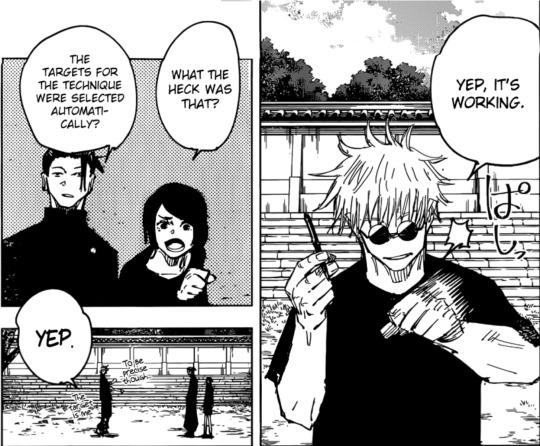

There's an interesting connection found between Gojo's technique, his need to cover his eyes and the narrative distance that does not allow us to get any closer to his character. It's precisely when Gojo puts his mind to perfecting his usage of the Limitless that an unbreachable impediment settles between him and the people around, resulting in him and Geto from that point on being forever unable to get through to each other. With his technique taking a toll on his body by becoming more overwhelming to use after such a rapid increase in power, it's also when Gojo starts to wear his shades all the time. And whereas before we were allowed to look past the tanned spectacles and see his eyes, read the emotion in them, now we're denied even that much. It's probably a short after Geto's defection when Satoru switches to a blindfold, indicating how he completely shuts off emotionally. Just as Geto's Curse Manipulation stands as a metaphor for him repressing his feelings till the breaking point, Gojo's mental state is reflected through the physical appearance, too. Him physically distancing himself from everything within the world around him with his Limitless technique sustaining an uncrossable invisible barrier around him and his blindfold hiding his eyes from the viewer is also how his emotional detachment is established on the meta level of the narrative.
Since Geto's defection, Gojo's defenses are breached in the main timeline just once, and that is during Shibuya Incident Arc. It's barely a coincidence that, as the Limitless falls short and the ever-present physical distance is crossed sharply with the Prison Realm reaching Gojo, the emotional distance is immeadiately eliminated, too.

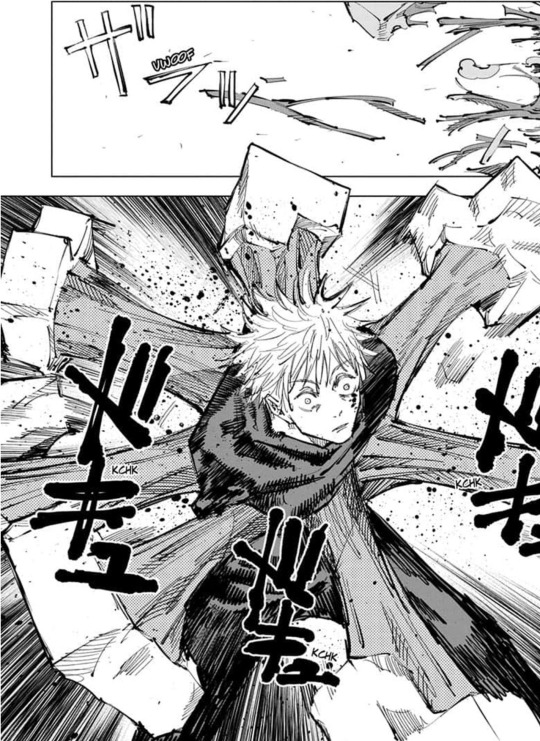
All defenses down and the memories of his youth flooding through the cracks, Gojo suddenly isn't numb to all the hurt of his past mistakes and what it cost him and the people around him; all the ache of losing his best friend not once but twice and being utterly unable to do anything about it still weighs on him. Neither is numb to all of it the reader, not anymore. The narrative 'catches up' to Gojo at this moment. It was an alienating, almost inhumane experience to never get a sight of Gojo's emotions when it mattered the most, at the pivotal events of his life which come to shape him as a character and as a person. We were simply denied that intimacy. But with Satoru's physical body made within reach and his mind suddenly transparent, laid bare, the delayed heartbreak is alive and present as ever. The weakness of his human heart is exposed, but it required crossing the Infinity to get to his heart.
The physical distance is only breached because the emotional one is eliminated beforehand. However, we finally get to catch a glimpse of Gojo's true feelings because something within the world was able to reach him physically, penetrating through his Limitless technique. The two are the sides of the one coin, they go hand in hand within the narrative, ultimately rendered inseperable by it. At the end of the day, the body is the soul and the soul is the body.
I've started writing all this well before the spoilers for the last chapter came out, but what we see in it, at least how I personally take it, speaks in favour of pretty much everything I've been talking about above. It's somewhat notorious how little emotional impact Gojo's fight against Sukuna lands. Until now. Until Gojo's Infinity utterly fails to prevent his body from taking the damage. Once again we gain insight into his interiority the instance he's physically exposed to the world. With Gojo's invulnerability ultimately overcome, the narrative grants us access to his inner feelings and thoughts one last time. Satoru's heart is an aching wound split open one last time.
#jjk#jujutsu kaisen#jjk analysis#jjk meta#gojo satoru#geto suguru#jujutsu kaisen spoilers#jjk manga spoilers#alright i'm posting it just to get it over with#i'm so exhausted and overwhelmed with what we saw in the spoilers this week#emotionally stunted head in my hands you know the drill#god i wish i never got into this manga#not when something like this makes so much sense narrative-wise#it's unbearable#the implications i was trying to pull off here is probably incomprehensible#but i don't have it in me right now to care
173 notes
·
View notes
Text
new pokemon episode!!!
#vi rambling#pokemon#this ep was great honestly... i kinda lowered expectations because i kinda... disliked last ep lol . a lot didnt make sense#but i really liked basagiri's characterisation and seeing more of lucius.. that flashback was really sweet and a lot can be inferred from i#and there were great moments direction wise. basagiri locking them in with the rock tomb and liko terastalizing were really great#i will say im a little disappointed it didnt last for one more episode? it felt a bit short lived in comparison to the others?#because the pacing was mostly spent on looking For basagiri. and when we finally find him ig all just feels pretty short.#honestly i think my biggest problem is perrin because as much as i wanted to like her her presence felt pretty unnecessary imo.#until now the series has done a shockingly very good job at implementing the game characters in a way that doesn't feel forced#but in this case it.... kind of is. i didnt feel like she did much other than providing the initial picture and her dynamic with the others#didnt stand out enough for me to feel like the characters gained anything from her presence. there was the cute moment with dot last ep#(which was honestly the highlight of the episode imo) but its very short and doesnt change much or provide much insight on perrin herself.#mostly sad the rest of the rising volteccers are being kinda shelved for this... which is transparently the intervention of gamefreak#wanting to promote the games. ehhhh whatever whatever. i cant decide if what would solve this would be perrin staying longer#or just writing her out. no clue.#anyways DIANA IS BACK LETS GOOOO. i will say seeing liko's growth is really satisfying and so is rhe rest of the kids#and this ep did a much better job at that than last episode because seriously im so... what was with that.#ITS FINE im not gonna be negative about last episode i enjoyed this one and thats what counts. i need episode 75 very badly#FOR THE THIRD TRAVELER REVEAL... i dont remember her name but . this sounds fascinating i NEED more of gibeon and lucius#from just the little information that is scattered and inferred... they fascinate me.#also i realize why lucius fascinates me so much.#something to do with... a kindhearted gentle looking hero of old.... with blue hair... who roams the land helping the people (or pokemon)#who sort of haunts the narrative as rhe character who's legendary legacy the main character is following after his journey has ended...#HMMMM.... HIMMEL CODED MUCH..........
1 note
·
View note
Text
this is one is important as fuck i see so many people not understand this and it drives me crazy
"Sburb ruins, mythic challenges, and personal quests generally tend to come off as shallow busywork, stage props, or set pieces in a spurious Hero's Journey. Rose either faintly glimpses this truth at this early stage, or she's just hitting her rebellious teen stride. Either way, she doesn't take the surface value of the quest seriously at all, and only wants to smash it apart and loot the secrets. My sense is that the average reader reacts to this impulse unfavorably. Because readers watch the formula play out so often, they are trained heavily to respect the journey of the hero, to anticipate and crave its fulfillment, to see it as something verging on contractual in their relationship with a story. So a gut-response to this recklessness is like, "ROSE, NO! STOP THAT! You simply must complete your quest and play the rain!" What comes with this view is the feeling that her evolution as a character is only being delayed for a bit while she gets some anti-narrative foolishness out of her system, and then we'll get down to business and watch her do her quest, play a whole BUNCH of rain, and reap the narrative satisfaction. There's just one problem: she never does that. This candy-coated Kiddie Kwest is at no point ever taken seriously by Rose or the narrative itself, nor should it be.
When trying to parse character arcs, we look out for certain beacons. So when we hear "play the rain," we're like, ah, GOT IT. That's Rose's arc. Once she finally gets over this destructive teen bullshit, she can wise up, play the rain, and her arc will be finished. Wrong. This is almost a red herring arc. Her quest on this planet, its patronizing presentation, its intrinsic shallowness, is a mirage surrounding her that represents a fully regimented series of milestones for achievement and personal growth, much as society dubiously presents to young people in many forms. The true arc-within-the-arc is actually an upside-down version of what it appears to be. What Rose is doing now, which seems to be misguided recklessness taking her further away from the truth of herself, is actually better seen as a good start to her real journey: breaching the mirage of regimented growth, exposing it for the charade it is, and pulling the truth out of it. The real conflict in her arc comes not from the fact that she refuses to take it seriously, by destroying it and taking shortcuts. It's the opposite. It's that, upon trashing her planet, she continues to have this nagging sense that she should be taking this quest seriously, much like how a young adult may have a nagging sense of guilt that they aren't "being an adult right" by the time they approach adulthood. And this nagging, unanswerable guilt arises from the truth that the regimentation of adulthood is completely fake. It was always a mirage. Learning this, making peace with it, is part of the growing process for many, and it is for her too." -Andrew Hussie
intrinsically queer as fuck, too, btw
#sams reading homestuck again#homestuck#rose#i also see this in particular interpreted as a 'writing mistake' from hussie#no. its on purpose.
4K notes
·
View notes
Text








The Spinjitzu Master
some yapping below the cut :D
hey guys i made a comic!! I actually finished something!!! yayayyayay!!!!! I've been so busy and stressed lately and this was a nice thing to chip away at to de-stress n stuff. The one time I tried doing a multi-page comic like this I totally lost steam in the middle of it and didn't finish, so at the very least I'm happy that I managed to like. get anything down on the page at all lol.
Anyway I'm always thinking about this little guy.... his life was so sad bro like what the heck. Granted we don't actually know that much about his life, but you can extrapolate stuff, and that's basically what this comic is. I like to think that the fsm kind of stumbled into some of the things he did early on in his life. There's like, no way this dude was nearly as cool and epic and in-control as the narrative makes him seem. In my mind he's just as lame as the rest of his lame-ass family; it's just that everyone (his sons, the ninja, the entire rest of ninjago) idolizes him so much and can really only see him as this kind of legendary figure. In reality I think he was just a lonely kid dealing with a lot of like. war and conflict and general suffering. And then (at least in my mind) he managed to get a couple of lucky breaks which eventually lead him to carve out his own little space for himself in ninjago. So I was thinking about that kind of thing 👍
(And then you can see how all of that stuff bleeds into how he raised wu and garm, but that's an entirely different thing for an entirely different day lol)
I'm like 90% sure I got something wrong/mixed something up lore-wise and that this whole thing doesn't actually make sense as a result. but also! The idea felt clever enough to go ahead with it anyway :3 and I wanted to post it before the show dropped more fsm lore (seriously when is dr gonna get into more ninjago history... I can feel it on the horizon it's like the one big thing I'm looking forward to... give me more lore dumps!! more flashbacks!!! more!!!!!!!)
#this took like a little over a month to do so im really happy its done now :33333#ninjago#lego ninjago#ninjago fanart#first spinjitzu master#ninjago first spinjitzu master
1K notes
·
View notes
Text
Overanalising Moral Orel: Clay, Bloberta and the Colour Theory
p.1 Clay
Interesting thing about visuals in Moral Orel for Clay and Bloberta is that in Help, upon the first meeting, Bloberta wears red and Clay wears blue – in colour theory those are split-complementary colours, the are not exactly opposites, so the don't contrast of clash against each other.
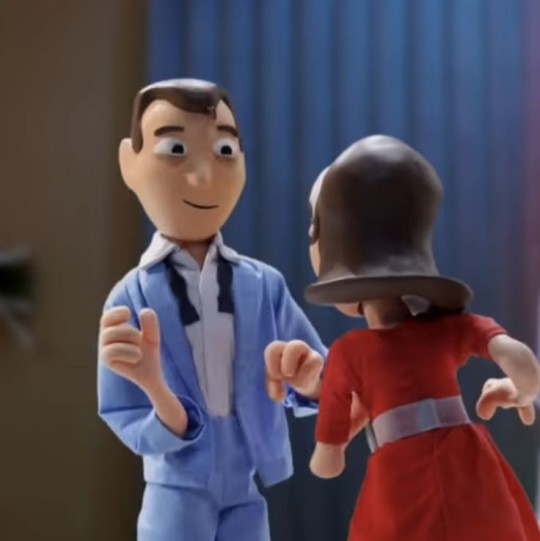
Clay's light blue is cooler, more purple-ish, and provides soothing visual effect to Bloberta's bright warm red-orange.
In design, the cool colors can help soften the intensity of the red, creating a balanced and visually striking composition. In this moment they are more in harmony than they will ever be.
By the end of Help, they are married and utterly unhappy. While Bloberta sticks to her reds even after marriage, Clay moves to greens. The are truly complementary now, but also absolute opposites.
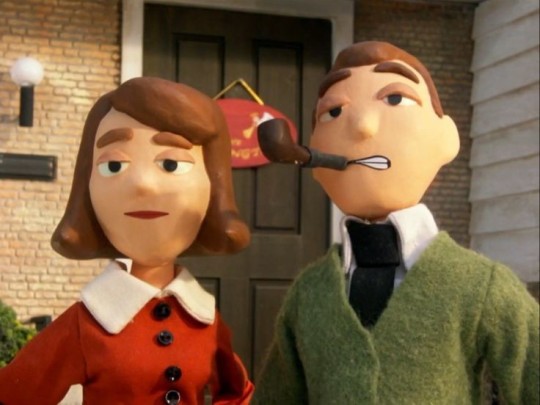
In visual perception there's also such phenomenon as impossible colours. These are the colours that are on the different wave length and thus cannot be mixed during the initial perception. And look who's on the list:

So, visually Clay and Bloberta stand in stark contrast and by no means are mixable. As if it's on purpose. You see, it's notable how Bloberta stuck to her colour identity through the series, while Clay shifts all around the place. It's green > light blue > green/brown. As if he changes his personality on purpose to be farther and opposite to Bloberta.
We know he has a crappy sense of Self, but it is also all over the place, how he creates his Identity based on who is near, who is wanted and who's not. In private environment he tries to distinct himself from Bloberta as far as possible. It's to spite her, to show her how much he doesn't want to be tied to her, but mainly it's for him – a way of protection and masking for his Self. His identity is of Bloberta's opposite.
There's also a narrative meaning for Clay's green. It's immaturity, childishness. He wore green in Passing, he started off in green. A short period we see him in blue is rare moments of relative wellness. He is starting to come to his own meaning, living by himself and for himself. He was also trying to distinctly set himself in this world, establishing a particular colour identity. Possibly, if he'd never married Bloberta, there would've been something different in his style maybe darker blue. Light colour and also his appearance and demeanor (a stray curl) is also symbolic of his remaining innocent and naïvity.
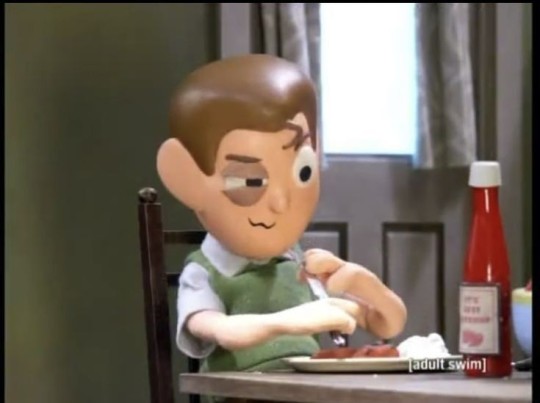
Once he goes back to greens, it also feels like he makes a huge step back from his initial route. From there on he either stays in place and doesn't grow as a person or spirals into something worse.
He also adopts brown in his clothes. To work, to church, when they have guests or in winter – he wears brown suit or coat. It's a formalwear, there's nothing strange about it, but interestingly, it's his wear for an outer world. It's neutral, uncharacteristic, a Persona he needs to show to the community to give off the impression of competence and respectability. Bloberta, on the other hand, again keeps her red. They look very homogeneous together in this composition.
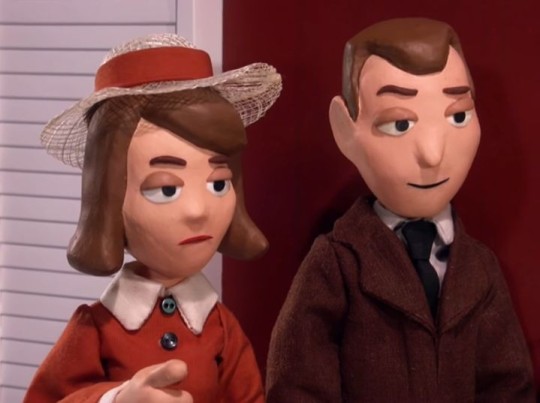
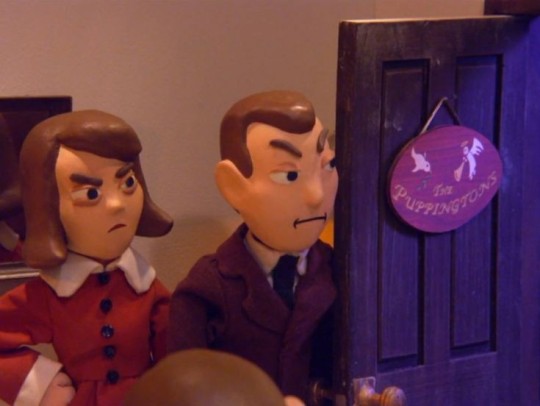
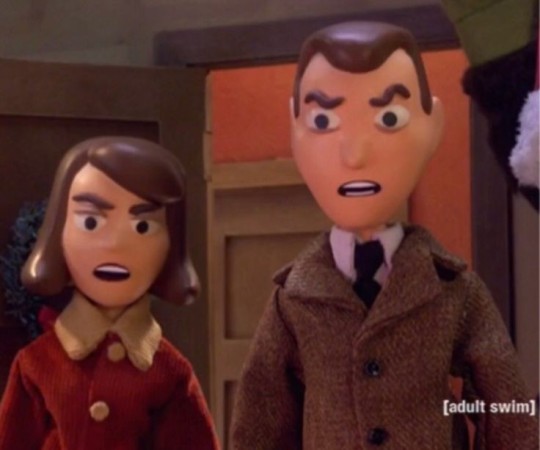
Clay's brown is actually a darker, less saturated hue of red. Position wise, they are the same, analogous here. It's also a part of the Persona – unity of husband and wife. They don't clash visually, quite opposite – the one is an extension to another. Exactly what the society expects from a nuclear family unit. When they are positioned like this, they also get along sometimes, they are less focused on getting on each others nerves and more on presenting to the community, so they are able to put personal attitudes aside and actually chill.
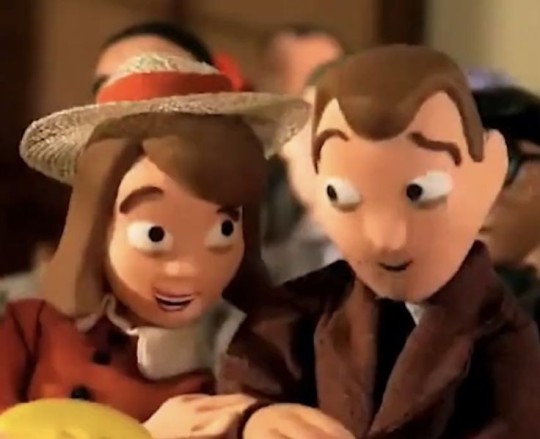
The complete opposite is Clay's Study. Here, he's alone. It's and established power fantasy for him, a place of delusion and unreality. It's everything he longs to be but is not. In his study he wear a deep dark-red dressing gown. In this environment we usually see his truest self – his intentions, his attitudes, his feelings etc. Red as a personal colour and as a scene undertone sets the impression of power. But the truth is – he never has it. All the disasters of his behaviour, that are set in real scenarios are carried out by his real Personas – in green or brown. What's hidden – is in red.
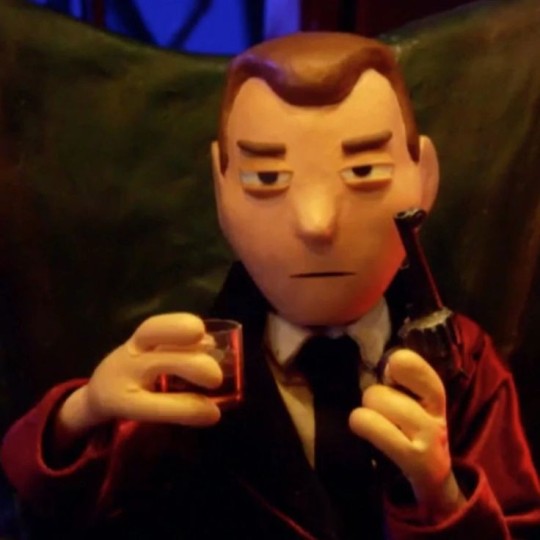
It follows him even where he tries to conceal it. Bar scenes, hunting trip spiral scene, Danielle's flat scene – he's supposed to be a Persona, but the red shadows are there outing what he wants to hide.
(Upd: i forgot that Passing, up to Angelas death, is also with red undertone. For Clay red is a colour that signifies disaster and unhappiness. Red is everywhere where he is about to act out, prompted by his misery. It's like and angry sorrow, that follows him. It's such a cruel joke that he even married a woman who is in red.)
Red is a colour of his ideal self but also of his self-destruction. It notable for the way those two meanings always go hand-in-hand. Even in his ideal fantasy he doesn't allow himself to achieve happiness. Red is a colour of two forces that tear him apart and send him into a spiral over the counter of the series.
But Clay's red, unlike Bloberta's, is also unstable and irregular. It's notable how all his colours are on the surface level, its a piece of clothing that is put on something. Green cardigan – a mask for Bloberta, red dressing gown – ideal self for himself, brown jacket or coat – a mask for the community. It's all a wrap for his real self, that it too raw and painful to show to the world. Underneath his colours is white – blank and reflective. It's certainly reflects Clay's shallowness – underneath all that colour is nothing, white, blank space that is occasionally filled with something to fit a the specific situation. White is his absence sense of self. White is his actual subconsciousness. Only time he wears white is to bed. And in his sleep is also the only time when his actual suppressed self resurfaces foe just a bit, for us to see.
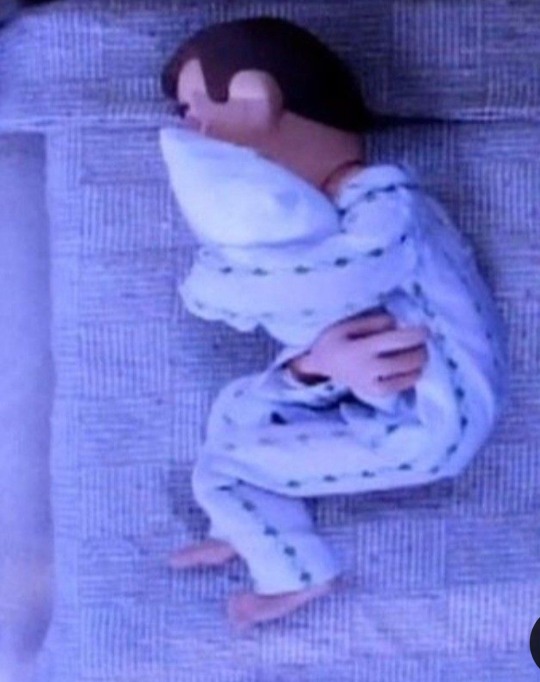
What we were able to read through his colours themes is that he is a man with a damaged sense of Self and a fake personality, that is never authentic to his true self. It leaves him feeling vulnerable and exposed so he reacts with anger and anatgonism to protect his core. His weak sense of self leaves his susceptible to many kinds of influence – his initial reaction is to confirm, even if he'll resent it in the end. He always adopts a personality according to the relationship of situation he is in.
So Listen, maybe the suit is just blue or maybe no, maybe it actually represents something. This whole thing can be all bs. I also understand the character design process and how main characters need to be recognisable. We are overanalising shit here, sir.
Next's Bloberta.
p.2
167 notes
·
View notes
Text
Curly originally not having a pre-crash model makes SO much sense to me. When I first watched this game I genuinely thought that that was how it was going to go too and we'll finish the entire game without ever seeing Curly.
While I don't mind that we know what he looks like (and prefer it that way), I also think it would've been very fitting if we never get to see Curly. It matches one of the focus in the game which is the continuation of the objectification and dehumanization of Curly. We only get to see him after the crash, whatever he looked like before that is never focused on, we only see him after he got everything taken away from him. We only get to see Curly through Jimmy's POV after the captain is now 'useless' and a 'burden' meant only to be kept quiet and whose pain is an annoyance to him.
But even before that, us not knowing Curly is already kind of prevalent, because Curly doesn't know who he is either. A big chunk of his character is that he's unsure and confused on what he wants in life and has no clear direction. He's 'on top of the ladder' but he doesn't even want to be on it but he doesn't even know what he actually wants to do outside of working for Pony Express. Us not knowing what he looks like feels very fitting on how Curly sees himself.
And the thing is, Curly hid a lot about himself to everyone else, too. He refused to open up to Anya, instead choosing to do so with Jimmy, who's view on him is way more idolized and deitified thanks to his twisted perception on Curly, and then villainized when he's angry with him. Curly closed himself from everyone else, and the person who knew him longest chose to twist Curly into something he isn't.
Thematically wise it would've made a big impact, the character who continues to haunt the narrative being known only after he's basically unrecognizable and who's face is never truly shown before, Curly only being known through his unsureness of himself and Jimmy's twisted perspective.
#mouthwashing#imagine what the fanarts would look like if we never see curly pre crash#curly mouthwashing#eva speaks#again i prefer that we know what he looks like but MAN#the second i read that new info it all make so much sense#of COURSE they originally didn't want to show him. it makes so much sense#i knew he was always meant to be a hidden character
136 notes
·
View notes
Note
There's been some discussion recently about MC that caught my attention because I agree. MC feels like a loser when you think about all of the other characters. When I play an MC who did nothing wrong to Seven it just feels like Seven is angry for no reason. Seven is allowed to act like a child while MC has to take it? Doesn't seem fair.
Everyone has something going for them and what about MC? No one likes them and everyone hates their guts. Aren't they supposed to be the main character? Why does everyone hate them? Why aren't they considered more talented? It just feels like MC is a doormat while Seven and the other ROs are these talented superstars.
I don't want this to come off any way but I feel like the story would be stronger if you made MC a bit meaner or at least made people acknowledge MC as a better singer.
I don't want to sound rude but I'm very much exhausted by this topic. I've probably explained this 5+ times but I'll try to break it down one last time just so people can understand what I'm trying to do.
First, to get it out of the way, we are only on Chapter 2. I just want to reiterate that. The story just started.
It just feels like MC is a doormat while Seven and the other ROs are these talented superstars.
Secondly, MC is a character I try to give as much customization to, both personality and appearance wise. There's a variety of ways you can approach everything, or I at least try to in a way that doesn't sacrifice what I want to write for the plot, but I think people are under the impression MC is 100% a blank slate character when it's not true.
MC is still dependent on the plot and I always strived for MC to have their own narrative arc. The same way the ROs have their own character arcs, MC will have their own, because they are a character in their own right and going through some that fundamentally changes their life. That means the MC from Chapter 1 will not be the MC at Chapter 20. They will be different. That's what a character arc is. Character development is expected. How can you expect a slew of ROs to grow and change and MC remaining stagnant? Doesn't make sense narratively and it seems unfair to MC.
The MC is not a completely blank slate, and that's where people are getting it confused. In the beginning, MC is going through such a change with BOTB, without their family, and on the heels of a band breakup that's still impacting them today. MC is a little down, maybe even depressed if that's how you read it, and they're getting pushed to be leader by their manager. They are not really okay right now. They have to be professional and put on a brave face for the sake of their band, who, if you paid attention to what Rowan said in Chapter 2, are all depending on this. This is what they worked for since high school. MC is not going to flip a damn table on Day 1 just because you want them to. MC can fight, if you choose, against UWB. That's not supposed to be a smart choice, but emotions get the best of all of us.
They are only just navigating a worldwide globally famous show with a cheating allegation hanging over their heads, and a manager who wants them to be leader when, up until now, they haven't been. They've just been friends making music and miraculously having a fanbase. Now they're really in it. They have been thrust head first into the industry in a way that is so big that MC has to go from singer playing with their friends to a leader of a band who may just become globally famous in a few months if they play their cards right.
A lot of their actions are influenced by the fact that their band almost broke up and it's a thing that hangs over their head. Their past influences them. That's...how people work.
Now, if we're at Chapter 20 and MC is still acting like a scared bunny who doesn't know what they're doing, then be my guest. Scream in my inbox, I'd understand. That would be terrible writing, but we're not. The tour just started.
I play an MC who did nothing wrong to Seven it just feels like Seven is angry for no reason. Seven is allowed to act like a child while MC has to take it? Doesn't seem fair.
MC doesn't have to take it lol. I've always given an option to be rude to Seven/try to put them in their place.
People think I favor Seven when that's not true. (Seven isn't even my favorite RO)(That title goes to August lol). Seven acts the way they act because they are not in a healthy headspace. Their actions are not meant to be understood, because they are not entirely justified. Seven has a lot of growing up to do, but I have never sat here and advertised Seven's emotions as correct. Everyone knows Seven is childish, everyone knows Seven is handling everything terribly. People in the story have mentioned it. Their abandonment issues GREATLY influence their characterization and actions. MC has abandonment issues as well, of course, but MC is not as emotionally unstable as Seven. That's canon. It is what it is. Seven has a whole subplot about it.
As do other ROs. The only difference is that they're not so open about their struggles. Seven just doesn't care. Their emotions guide them. They can't control it. That's who they are. I have also said that many times.
I don't know why you think Seven can get away with everything when 1) it's only been 2 chapters and 2) no one knows how anyone feels about Sev because it's in MC's POV. Seven goes through their own trial by fire. As every RO does......thats a narrative arc.
Seven was always going to be a plot point, whether they were an RO or not. They were always going to be MC's former best friend.
Everyone has something going for them and what about MC? No one likes them and everyone hates their guts. Aren't they supposed to be the main character? Why does everyone hate them? Why aren't they considered more talented? It just feels like MC is a doormat while Seven and the other ROs are these talented superstars.
This one bothers me the most, mostly because I don't know where this came from. "No one likes them" Jenna and The Jewels does. Slow Crawl does. Their fans do. We haven't even properly met the other bands. Of course there will be bands who don't like MC: they're competitors. They're not friends. They don't know MC, why would they be biased towards them? Because they're the main character? They don't care about that?? It's how fiction works.
Maya is following the band around because of how much she admires MC.
Orion quit his job because MC's singing inspired him that much.
G listened to MC and saw something in them. Literally calls them the 'Chosen One'
Fans of the old band preferred MC over Seven. They liked the songs where MC sang solo. MC was better for their future over Seven. Hence why it was Seven getting demoted, not MC. I've said this. It's in the story.
I don't see how being the lead singer of a band on a global show at 26 makes anyone an actual loser but I digress.
Literally in Part 2 MC is acknowledged so maybe it'd be better if we waited? Say a good few chapters...?
If you wanted a story where MC is Queen level famous right out the gate and the #1 draft pick for BOTB and has no problems and better than everyone, then I'd advise you to look elsewhere. I don't like that. I like giving MC obstacles because conflict creates story. I like MC having to fight for their spot. It's more realistic, and this has never been a story of fame. It's been a story of their journey to fame.
That's their narrative arc. They grow into it.
You are allowed to hate/dislike Seven. I encourage it. I have given MC the option to hate Seven, because I'm aware that what Seven is doing is unfair. I am not punishing you for hating Seven. And this goes for all the ROs. It does not bother me if you dislike my characters. It means I haven't made them squeaky clean and have made them realistic enough to have people both dislike and like them, much like real life. I get it.
I've always advertised Infamous as a messy, angsty and dramatic story. I've used the term 'melodrama' for it often. I've always said the ROs--especially Seven--are flawed. Some more than others. I've said, verbatim, they are not wholly good people. I don't know why people act so shocked when they act some type of way. Like...I've always stayed true to what the story is. Half the dynamics aren't healthy right now...but that's the 'growing up part' of the story we haven't even gotten to yet?
If that doesn't interest you, then that's perfectly okay! If you don't like the narrative arc I have planned for MC, that's fine too! It just becomes a bit disheartening when people ignore the narrative.
I will try harder to write in a way that specifies my intentions. I always believe that if more than a handful of readers have the same complaint, then it's on the writer to fix it.
I hope my tone didn't come off rude, I'm just really really tired of this. I've had to deal with this since even before the demo dropped :) but your critiques are valid and everyone is always free to express themselves however they want. <3
#inbox#'MC is a loser' convo will always follow me I guess#MC will win a grammy and someone will be like: ���they're kinda...loserish though? imagine winning a grammy at 30 and not 20 lol”#/j#ill add this to the faq and never talk about it again
672 notes
·
View notes
Text
OKAY so I am re-listening to "Death and The Queen" again and I am having Thoughts™.
I can't find any info about when this drama takes place continuity-wise, but my personal placement would be after "Planet of The Ood" (4x3) and before "The Sontaran Stratagem" (4x4) because 4x4-4x6 take place directly following each other with Donna stating at the end of 4x6 that she plans to travel with the Doctor forever. Donna's determination to continue traveling w him is in keeping with the conclusion of Death and The Queen, where she comes to the decision that the Doctor IS her "happily ever after," as it were. Placing the drama after "Fires of Pompeii" and "Planet of The Ood" also makes sense with Donna's desire in the audio drama to have a break from "the extraordinary" of traveling with the Doctor (specifically, horrific death and destruction,) which adds understandable context to her seemingly being so willing to leave the Doctor after searching for him for so long.
(Don't talk to me about the ending of Forest of The Dead. It's unlikely Donna would have left the Doctor even if she found Lee. Donna's desire to confirm whether Lee was real could be easily contextualized by her wanting to know how much of her experiences inside CAL were a fabrication, and what the supposed "perfect husband" persona would have said about her if it was drawn from her own mind. Also it was written by Moffatt so it shouldn't count anyway.)
ANyway, what I actually wanted to talk about. Notably, considerable emphasis is placed on Donna enjoying her role as Queen and especially caring for her subjects and having power to help people. A greater amount of text is dedicated to her talking about how as Queen she can care for her subjects than her love for Rudolph, even before the reveal that he is human(?) trash. Her attachment to the role of Queen that marrying Rudolph will grant her is established to be largely based upon her passion for helping people rather than luxuries associated with rank, especially in view of the montage of how royal life on Gorotainia is not as glamorous as she hoped but is still enthralled by being Queen. Later in the story, when danger has appeared, her main role in the story is sacrificing and taking the lead to protect her subjects.
Notably, when things start going downhill and Rudolph starts talking to her about the difficult choices that he must make as royalty she comments that Rudolph is “just like HIM” (the Doctor) and that she went with Rudolph to escape these darker aspects of her travels with the Doctor, specifically the hard choices that go with the role the Doctor plays in the universe (while she doesn’t connect these concepts directly, these two statements are placed very close to one another textually.)
Only when her relationship with Rudolph and role as Queen seems like it will involve some of the same dark choices that her travels with Doctor did does Donna decide she doesn’t want to be involved anymore, which is quickly reversed when she finds out she needs to become Queen in order to protect her people. (I love Donna. In case you can’t tell.)
The narrative has established that a large part of Donna’s attachment to her relationship with Rudolph is potential authority to help and guide people, and that her main interest in pursuing a life with Rudolph rather than her travels with the Doctor was her perception that her role as Queen of Gorotainia would not involve the same death and destruction she has seen with the Doctor. Perfectly understandable after experiencing something like Pompeii.
Donna’s compassion and empathy have been essential components of her character since her introduction, with her wanting to protect the Doctor despite being irritated with him and feeling sorrow for the children of a Rancoss that wanted her to be eaten in “The Runaway Bride”, her taking the time to mention Stacy in “Partners In Crime,” and literally everything in “Fires of Pompeii” and “Planet of The Ood’. Donna has always taken the time and the energy to think of others and work to protect them, even this early in her run. In view of how deeply she feels the pain of others, it is understandable that she would find the idea of a world where she could help others from a position of power without all of the death and chaos and destruction appealing, and her outrage at Rudolph for once again putting her in a position where she has to witness (and potentially be responsible for) terrible things happening to innocent people is believable. He proves that being a Gorotainian royal is like being the Last of The Time Lords. On a smaller scale, sure, but still.
So the text (and Donna) have set up the idea of Rudolph being similar to the Doctor in role, so what is the difference? Rudolph doesn’t much care about people. He is willing to sacrifice his own people quite coldly.
The Doctor does care about people. How good of a person he is, or how good of a job he does caring for people is up for debate, but he cares.
Which all leads me to this quote from “Beautiful Chaos,” that I cannot believe is cannon and real and published.
Why does Donna love the Doctor?
"I wish you could see what I see. We've been to places, to worlds, to futures and pasts you could only dream about. I think half of them I dreamed up because they can't be real. But they are. And everywhere we go, we make a difference. We put things right, we make people happier. That's what the Doctor is all about. He finds a way for the universe to make sense. And I love him for it.”
Donna Noble wants to make a difference. No matter where she goes, she cannot escape the death and pain and suffering and chaos and nonsense that is the universe, and she can’t help but want to help. And right there beside her, the Doctor is working to put things right too. And she loves him for it.
We have this entire drama dedicated to Donna wanting to make a difference, while also escaping the darkness of the universe, and she learns she can’t. There are no happily ever afters.
Except with the Doctor.
I have so many feelings guys.
#tendonna#ten/donna#feel free to interpret this as platonic if u want but this is why I love them as a couple okay#they are whole independent people who learn that if they stand together they don't have to carry the whole world on their shoulders#they understand each other and they have goals that are fundamentally compatible#how is that not sexy#ten x donna#doctor/donna#doctor x donna#donna noble#this is a Donna Noble Stan blog#tenth doctor#big finish doctor who#death and the queen#doctor who#not me being afraid my old English lit teacher will find my tumblr and give me notes on this#1K word essay lets go lads#dw meta#THE TENDONNA THESIS LIVES#I AM FERAL FOR THEM#GRASPS UR SHOULDERS AND SHAKES VIOLENTLY “THE POTENTIAL!!!!!”#okay so maybe Rudolph kinda cares but he has the spine of a wet noodle#not sure if any Rudolph stans are hiding out here tho#not gonna bash any other ships here but#is this not substantive??? Is this not compelling???
69 notes
·
View notes
Note
Hey red, what's your opinion on some modern writing that's very lamp shady? And do you have any advice on how to avoid "Well that just happened" dialogue?
It's an interesting question!
The thing is, lampshading exists for a reason, but it's not the reason it gets used a lot of the time. Writers might lampshade a narrative choice they're insecure about, while characters lampshade because the things they go through in a typical story are kind of bonkers, and we might expect them to notice. If a character signs on for a simple mercenary expedition and ends up discovering they're the long-lost prince of a kingdom they've never heard of, that's weird and they probably feel weird about it. If an ally is determined to 1v1 their super overpowered nemesis with no help from their friends, those friends might have opinions about how dumb that is.
This is a form of lampshading that doesn't break immersion because it's entirely in-character and doesn't lean on the fourth wall. There's a difference between a character noticing how weird their life is and a character pointing out how cliched a recent experience was. In the latter case, the character is treating their life like a story, and while it IS a story, they shouldn't know that.
There's a spectrum here, with "complete sincerity and taking every turn of the plot at face value" defining the 0-point and "complete self-aware uninvestment" at the far end, but healthy levels of lampshading live somewhere in the middle. Characters at the 0-point accepting everything that happens without question can feel just as weird as characters that won't stop pointing out the TVTropes entry they're currently living. It's about what it makes sense for the character to find disruptive or noteworthy. A hardened badass probably won't see the need to point out how bonkers a recent fight scene was, but a newcomer to the Cool Bombastic Adventure scene might be really excited when they pull off a cool special move and want to point it out.
I think this is why the recent D&D movie worked for a lot of people, because while the main characters all lampshade their lives to varying degrees, the way they do so makes sense for all of them. Edgin is a bard and storyteller so he has a slightly meta perspective on a lot of things, purposefully avoids playing along with certain narrative conventions and sometimes responds to other people's dialogue by critiquing their dialogue instead of just responding normally; Holga doesn't really care to understand how the world works and so keeps pointing out that they should just use magic to solve their problems, which is probably the most popular lampshade in the whole genre; Doric and Simon don't get a ton of time to shine character-wise, but they'll both occasionally poke holes in the pretense of the story they're in. The thing that makes this all work is Xenk, who plays absolutely every moment completely 100% straight and is entirely immersed in the objectively ridiculous setting of D&D. Same goes for most of the villains, except for Forge, who's probably the wackiest and most self-aware character in the entire movie, but in a way that makes him feel callous and disregarding of the people around him, like he's uninvested in the world not because he knows he's a fictional character but because he has too much money and power to care about anything. The ways each character does or does not lampshade their surroundings make sense for who they are as people and reinforce their characterization and place in the world instead of undermining it.
I recently watched a couple episodes of Stargate Atlantis and noticed something similar - the main character and, to a lesser extent, the rest of his associates from Earth have a tendency to make wry observations about his objectively bizarre life and the eccentricities of the people around him, which helps contrast against the extremely serious and businesslike Cool Space Warriors they keep accumulating, which helps make them feel (a) distinct from each other and (b) relatable considering all the weird stuff that happens. And the protagonist switches off the quips as soon as things start looking perilous for his team, so you never get the impression that they aren't invested in the story they're living, and as a result the various quips and lampshades come across more as a habit or a coping mechanism than a disruption to the narrative itself.
So basically I think you can get away with a lot of lampshades as long as the character doesn't feel like they know they're in a story.
410 notes
·
View notes
Note
hello i would love to hear your general thoughts re: tenmartha if you feel like sharing them
okay so many thoughts about dr. martha jones and the doctor but one of the main ones is that despite popular (misogynoir-driven) belief, martha's character as written is much stronger than people give the series credit for. i think so much of her very strong character development and arc (based in her growing into her self-sufficiency, which was always there from the start and demonstrated in her constant analysis and questioning in the search for the most info to make the right decisions) is overshadowed by fandom racism, too much focus given to the unrequited crush storyline (which is also key to her arc, but is also something that she very distinctly and importantly gets over!), and general "she's not rose" sentiment. i think it's really interesting that unlike rose or donna whose narrative arcs need them to become super-human, martha essentially becomes the doctor's equal by the end of her run, if not surpassing him given the fact that as a human, she doesn't have those same otherworldly powers as him.
while i think the narrative of season three ultimately lets her come out on top, i think there is a big cost to that, for both martha the character and for the viewers. even separate from fandom racism there are so many moments of racism in the series that i don't think actually do anything to further the storytelling (literally fuck the whole human nature/the family of blood storyline) and that puts a damper on much of that whole year for me despite loving the characters. i also understand why the doctor (via the writers) is constantly comparing martha to rose, but the moments where martha calls him out on it—while they are certainly there—aren't always enough. i think that fact that martha also begins as fairly dependent on the doctor's validation (which like. makes total sense, she has no idea how all this works and is getting thrown into insane scenarios with no info from the jump) gets reduced to calling the character "needy" which just simply isn't true. this is also something that i think people focus on a bit too much rather than seeing how that particular character trait shifts throughout her season.
all this to say, when tenmartha is good, it's fantastic. freema agyeman and david tennant's chemistry is so on point, and that saves a lot of otherwise mediocre-to-bad writing. from the jump martha is shown to be so SO fucking smart, self-reliant, willing to take risk, and uninterested in the doctor's bullshit; when the doctor isn't just whining in the post-rose hangover or treating her like crap, he recognizes how powerful she is AND how much potential she has to continue to hone her skills, which is why he trusts her so inherently and ends up leaning on her so much during that season. the fact that he manipulates her emotionally to me is equal parts hard to watch and based writing-wise in a lot of the aforementioned -isms AND interesting character development from him because we haven't really seen that type of messy fucked up (human) behavior from the doctor. and then martha leaves on her own terms, which no other companion has gotten to do (clara's storyline feels different in that regard to me). she realizes she doesn't need him, arguably becomes his equal (or surpasses him) in terms of skill, and makes it out alive. imho that's a pretty big accomplishment.
#sorry ben this turned into more of an essay than i meant but. i love martha so much!!!!!!!!!#also on the personal note it meant a lot as a kid to see a black companion and i just always liked her#doctor who#martha jones#ten#tenmartha#majorbaby
319 notes
·
View notes
Text
Writing Tips - A Quick Guide To Plot Twists
There are two kinds of plot twists that we’ll be focusing on here; a trajectory plot twist and a retroactive plot twist
A trajectory plot twist is a plot twist that changes the course of the story going forward, with minimal impact on previous events in the story. An example of a trajectory plot twist is Hela destroying Thor’s hammer in Thor: Ragnarok
A retroactive plot twist is a plot twist that changes our understanding of previous events in the story. An example of a retroactive plot twist is Agatha and Sophie learning that they’re sisters in the School For Good And Evil books
A big rule in writing a good plot twist is that the result of the plot twist has to be at least as satisfying as the original plot trajectory, but ideally it should be more satisfying. If the twist isn’t as satisfying as the original plot trajectory, the audience can feel like they’ve been cheated or that they’ve missed out on something better
One more recent example of this is Hazbin Hotel’s song Hell’s Greatest Dad, in which Alastor and Lucifer’s song-argument is about to devolve into a full-on brawl. This is prevented, however, by an anticipated new character called Mimzy making her debut to the show by butting into the song, completely overhauling it into a self-absorbed showtune. While it narratively makes sense to prevent the fight, since that would have a lot of negative consequences plot-wise, and the introduction was very much in-character for Mimzy and got her across very well in minimal time, the fans were very annoyed with this and began hating on Mimzy because of it. The fans have largely agreed that Mimzy ruined the song and that it would’ve been much more satisfying to see the two fan-favourite characters fight rather than be introduced to Mimzy in that moment
Another thing about plot twists is that they go down better with foreshadowing; a certain pseudo-satirist once said “This story tries so hard to pull the rug out from under the audience it loses common sense”, and that can be a big problem with stories when their plot twists aren’t foreshadowed correctly. Surprising your audience can be fun, but they came here for a certain story, and if you just change it up on them without any warning then they’re going to be left very confused and feeling like they’re reading a different story. This is often the area of major Deus ex Machinas, where the audience gets to the twist and just has to pause and go “Wait, what? Where did that come from?”
The goal of a plot twist isn’t to make your audience go “I didn’t see that coming”, it’s to make them go “I can’t believe I didn’t see that coming”, especially since it adds reread value to anyone coming back a second time already knowing all the plot twists and now having the prior knowledge to spot things they might have missed the first time around. And if they did spot it the first time around, it makes it all the more satisfying when the foreshadowing pays off. You can only surprise them once, but you can always make them feel smart if you’re willing to give them a chance to prove it
OSP has a much more in-depth Trope Talk on plot twists if you want more insight on it, and I got some of what I said here from their video. So, yeah
#plot twists#overly sarcastic productions#trope talk#writing#writers#writeblr#bookblr#book#writers on tumblr#writerscommunity#writers of tumblr#writer#creative writing#writing tips#writing is hard
95 notes
·
View notes
Text
Inspired by some recent conversations, I'll do something I wanted to write out for a while - how would Bella Swan fare as the Sun Summoner.
Bella Swan is the go-to example of a poorly written "blank slate" protagonist, Twilight birthed half of the shitty fanfic tropes of the last few decades. I also shares a lot of parallels to SaB/Grishaverse as a whole, imo, but it a sort of "evil twin"/twisted yin-and-yang sort of way.
There's a lot I could go into here, but let's just stick to the premise - the heroines.
Firstly, it's important to say that their backstories are super important to how they turned out as people, so "Bella Swan as Sun Summoner" and "Alina with Bella's personality" would be kinda different - Alina's damage comes from not being able to grow up, while Bella's are from parentification, from being forced to grow up too fast.
(Since most of my audience is probably not familiar with Twilight, a significant part of Bella's backstory is that her mother is not a very practical, to put it mildly, and that Bella had to be the responsible one in the relationship from pretty early on in her life. Honestly, narrative-wise in many places, it feels almost like Alina was supposed to be the protagonist of Twilight (a 21st century teenager dragged into the supernatural kinda against her will) and Bella was supposed to be the heroine of SaB (a gothic heroine forced to grow up too fast, fascinated and drawn by the supernatural), but I digress.)
There's two ways her's backstory could go:
If we go the orphanage route, there's not really much that needs to be changed - in fact, she almost makes much more sense as a product of such environment than Alina. I'm calling this one Bellalina (she has Alina's backstory and talents, but with Bella's personality). Bellalina was a sickly child, who burried herself in books, dreaming of a life that seemed out of reach, while being forced to take care of the younger children and generally help around the orphanage, getting herself a brainy job in the army as soon as she could to get away. She'd have a much more complicated relationship with Ana Kuya than Alina has, similar to the complicated feelings Bella has to both of her parents (again, for my Grishaverse followers, Bella was heavily parentified by her mom and seems at least somewhat aware that it messed her up, and she has a distant relationship with her father, especially early on in the books, mostly because they're basically strangers when the books start).
The only problem with the orphanage route is that I kinda have hard time believing someone with Bella's personality would manage to avoid being discovered for so long.
Bella's original backstory is hard to transplant into the Grishaverse, just because of how differently marriage is treated in the Grishaverse compared to the modern world, especially in the social classes Bellalina would need to be to recieve the necessary education. I'm calling this one Liza, considering the slavic version of Isabella is some form of Elisabeta and she is Bella in the Grishaverse). But here's an attempt at a plausible version - Liza's mother was either a lower noblewoman or the daughter of a wealthy merchant, who eloped with a soldier when she was younger, but quickly changing her mind after getting a taste of the less-than-wealthy life, returning to her parents, either pregnant or with baby Liza. Grishaverse!Renée(Renata, maybe, if we wanted to slavify her name) and her family would certainly try to get her divorced or have the marriage annuled (depending on the relevant law in Ravka). This might work, or she might just have to wait for Grishaverse!Charlie(I'm thinking of slavifying his name to Kirill, which has different origins, but there's no russian version of Charles and I refuse to name him Karel) to die (which is not exactly an unlikely fate for a lowly soldier). Either way, Renata, due to having such sordid past (by 19th century standarts) and possibly still being technically married to Kirill, has hard time remarrying, only managing to do so when Liza is almost 16. At which point, Bella decides she might as well join the Ravkan army, seeing it as the best way to set herself up for her future (and probably to get away from her mom and her family, who probably didn't let her forget about having a common father and questionable legitimacy).
Either way, she ends up in the army - Bellalina still in the carthography unit, Liza, I'm not sure what Bella's skills would be good for in a 19th century army. Maybe some kind of communication officer? A clerk? Some kind of intelligence work (like, the boring, paper-pushing kind)? (that would be very ironic considering Alina's utter disregard for the concept of secrecy) A secretary/typist for some higher-up officer? IDK, something fitting for a well-educated, observant and intelligent, but physically feeble girl.
From here, the divergences mostly end.
She's sent across the Fold as part of an assignment, things go badly, she's discovered as a Sun Summoner, pretty much as it goes in the books.
Except Bella is into it. She's been dreaming of having a dashing hero sweep her away into a magical life since she was little. She would spend the entire ride to the little palace asking way too many questions like an over-excited toddler. She'd be crushing on Sasha so hard (especially after he saves her life).
She would dive into her studies head first once she arrived. Again, this girl dreamed about this her whole life. She loves this, she loves the power. Mental block who?
She is also very observant. She would clock Aleksander's immortal ass within two conversations (and probably confront him about it first opportunity to get him alone).
Bella is also significantly hornier than Alina, so Winter Fete would get much spicier.
Now, the real big question: Would she believe Baghra? My answer is no. Primarily because she would have confronted Sasha about the before-mentioned immortal bullshit before the Fete, and would probably recieve at least an outline of the plan at that point. (Considering how non-chalantly OG!Bella rolled with vampire murder lore, she would probably be fine with some tactical fantasy nukes, especially if framed through "protect the people you care about" lense). Also, if Bella was promised a good dicking, she would not listen to Baghra on principle, because she's horny and she's NOT going to be happy about getting cockblocked.
Que good ending, immortal overlord Sasha and his immortal saint wife Bella bring world peace.
38 notes
·
View notes
Text
you guys i can’t take this anymore i need to release steam from this pot of killer and dust thoughts that’s on the stove
listen. if you don’t know by now. one of my favorite things to do is bridge narratives between fanon ideas, and canon truths hehe
Killer and Dust. The accepted dynamic is basically killer being a pestering little shit and dust being over it.
THATS GREAT ON ITS OWN it’s funny etc
but think about their ACTUAL characters for a moment. they are two sides of the same coin.
⬇️
i don’t want to hear any of that old fandom “they are literally the same” shhhhh. nuh uh dear friend, they commuted the same (general) action💥
their motives and situations are very different however! which is important when it comes to understanding a character
They both played into an opposite role in their world if you ask me.
Killer partners with chara, filling the role of the player. he’s a lot like flowey actually.
(in killers world, while he is still a pawn of this sick game, he gets manipulated after all, he has taken on the ROLE of the player. everyone else are the pawns.)
dust is against the anomaly of dusttale, which is that worlds player.
dust is a pawn. a pawn that is defying the player of the game
(in the same way that killer is still pawned, dust still uses his fellow “pawns” as a means to “win” the game, meaning he’s also playing)
(but again, i’m speaking role wise)
Killer and Dust’s dynamic doesn’t have to just be haha funny, it has some actual merit and potential to their characters.
Killer is constantly looking for new forms of entertainment. something new. he’ll get bored, and if he’s bored he’ll have to look at himself. killer is very much a character representing disassociation avoidance and to an extent, escapism (huh. like someone playing a video game?)
Of COURSE he’s gonna poke at people. it’s INTERESTING. it gets a REACTION. he gets to have that small power trip of being in control, after feeling like he lost control this is something that’s probably addictive to killer.
meanwhile dust…well. killer acts like his own anomaly in a way. he prods at him, toys with him, he’s leering and he takes pleasure in any reaction dust gives. dust probably would resent this feeling without really knowing why. he feels like some toy, and he’d probably be inclined to even interpret a genuine interaction this way.
this honestly makes dusts inclination to shut off or dull down any emotion make more sense. be as unremarkable as possible, and you’ll be left alone, right?
isn’t that…kind of what sans does? he’ll repeat same lines of dialogue and such when he reallyyy doesn’t have to. he’s being uninteresting. (and no he doesn’t need to remember everything magically for that to be possible. in game he will poke fun at past conversations and dialogue so he’s clearly aware enough)
Killer wants a response, so dust doesn’t give one.
killer wants control and feels like this is a challenge, dust feels cornered and defensive
if they had existed in the same world, it would have been killer vs dust in the end either way.
it’s a big old game of cat and mouse until someone snaps. they need to be given the opportunity to understand their similarities
even in an interpretation where they are in a healthier relationship, in whatever capacity, i think these mindsets would be conflict they may have….
to killer , on one hand he may be OFFENDED by his lack of response. he may be EXCITED, it’s a CHALLENGE. he might take dusts resignation as a sign of submission, which would give killer a HIGE power trip.
he might. genuinely just be trying to have fun?
it could be ENTIRELY lighthearted, and it’s still…rather toxic, considering where that mindset branched from
and we know dust won’t be inclined to say anything. he probably doesn’t understand his own feelings to be frank💀 he just feels gross and intimidated and cornered so he shuts off and sees killer as oppressive , and grows resentful regardless of intent, as these feelings only feed into his crippling self hatred anyways
….thats all for tonight-
#utmv#ut au#undertale#sans aus#dust sans#murder sans#killer sans#bad sanses#THOUGHTS#PLEASE SHARE IM SISBDOD#this is unorganized and i don’t care hee hoo#headcanons#interpretations ig#dusttale#something new au#kist#if we want#😏#or not
124 notes
·
View notes
Text
Sometimes I think about the gap between the thematic perception of a theme/character versus how they themselves perceive the same thing. There's not too many gaps routinely like this in TDP except for antagonists — Karim comes to mind most notably, in how he earnestly believes he's doing the right thing with no pretense while becoming increasingly hypocritical — nor are all these gaps negative, per se.
But I think about it in regards to Rayllum a lot.
For example, in their actual relationship, they're pretty healthy. Rayla in particular has struggled with open and honest communication, but they're getting there, and we see that Callum has given her an unconditional, rather than an ultimatum base, upon which for her and both of them to build upon. They can teach really good lessons about taking time for yourself so you don't yell at your partner, that you have to work on yourself and a relationship won't fix your problems, that approaching things together is good and that you should support one another, etc etc.
However, thematically — identity wise — they are codependent to a super intense degree, wrapped up and incredibly dependent on the other person's construction of their sense of self (Rayla struggling to be a good person when she's reeling in the S4 fallout, because what does she have to show for it? Callum trying in 4x07 to push them both into their worst roles if the worst comes for him). And this codependency as well as intense desire to protect one another can cause them to make dangerous or self destructive choices in the name of love (or both), like Rayla leaving to protect him and luring Sol Regem away, or Callum doing dark magic and jumping off the Pinnacle.
Thereby, playing with this push and pull, how they exist and perceive themselves vs how they exist in the narrative (and may be seen as other characters) is well, a lot of fun.
This is also true for the "Rayla as Callum's method of destruction and salvation" theme that's been running through every season of the show, with Rayla being the lynchpin to burn down his old life / understandings of self and trust, and usher in new ones.
Callum doesn't see his relationship with Rayla as anything negative, ultimately; she's loving and brave and she saves people, she saved him, and he saves her right back. He'd do anything not to lose her, because that's the Right Thing to do to him, even if it's not automatically 'the right thing' for the rest of the world's safety.
But we know, thanks to their pattern (1x03, 1x04, 2x07, 3x09, general S4, 4x07, general S5, 5x04, 5x08) that it's something that can and has routinely gotten him into trouble in the past, particularly in S2 and S5.
We also know that Rayla fundamentally doesn't see anything wrong with Callum, either. "It doesn't matter" that he did dark magic before (2x07) and it likely won't ultimately matter to her again. She has so much faith and trust in him and his ability to do the impossible that the idea of Aaravos possessing him again in an awful way is downright hard for her to fathom. To her / in her mind, Callum is sweet and nice (even on the rare instances he yells at her), caring and loving and compassionate. And he is all those things, but even when one another's worst traits come out, both have a tendency to forgive and accept.
Now, part of this is because they have a mutual basis, for lack of a better word, of lines the other would never cross that are all conveniently the lines the other could never forgive (Rayla putting Ez at risk on a whim, Callum killing Stella for dark magic ingredients) which just perpetuates this cycle of support, forgiveness, and unconditionality.
Because unconditional love is great — until it's not.
And I think this blend of "they are actively healthy and actively working on being healthier" mixed with the "oh God quarantine them and their codependent shit together elsewhere for the good of society" is why they 1) have the range that they do and 2) the subsequent appeal that they do.
#rayllum#tdp#the dragon prince#the english major strikes again#bc that's the tag#analysis series#rayllum fandom#platonic rayllum#like callum is so fucking valid in 5x01 but So Is Opeli and like. perspective baybey
55 notes
·
View notes
Text
On Tee's Lonely Grief
I've seen people talk about New's and Phee's grief, Pimpa's grief but the gang has never been considered that much on account of their guilt. This episode, however, brings attention to that. Especially in Tee's case. Especially in the scene when he finds Non dead.
And I have to say, I fucking love this scene. So I'm here to tell you why.
PS: For the sake of this post, unlike what's normally my policy, the pictures used will not be edited in any way, shape or form unless stated otherwise. I think it would be taking creative liberties with the photography and it would diminish the validity of my analysis.
So:
Tee finds Non's body upstairs with his uncle's goons (dressed in entirely black outfits which obviously invoke death) very suspiciously looming over it.

So he does what capable and strong Tee, who has to support himself and his father and his uncle's business and now Non (as we saw very clearly this episode) would do: He lashes out. He demands answers. He threatens people. Because that's how he learned to solve his issues.
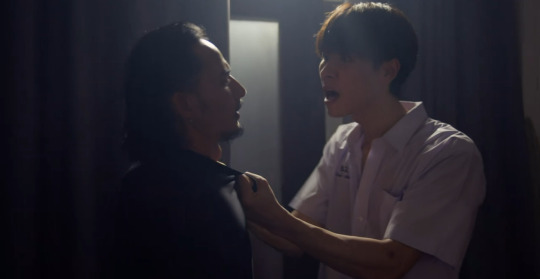
Yet he gets mostly silence. Arguably, the same exact silence he initially offers the 2 other people grieving Non this episode: New & Phee.
And so he argues with his uncle, makes accusations, mirrors New in the present moment so well it's uncanny.

And then he's alone. Everyone leaves, including Non's body. And now there's no one to perform that idea of a strong ruthless guy to. Now it's just Tee. And the contrast between the act of Tee and Tee is remarkable: one moment he's cold, and the other moment he's completely broken.
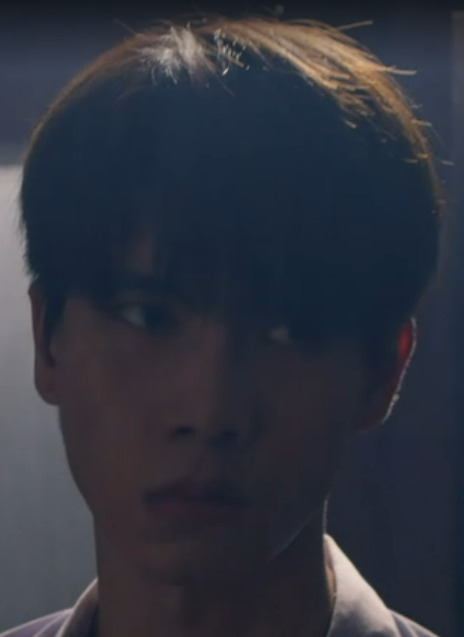
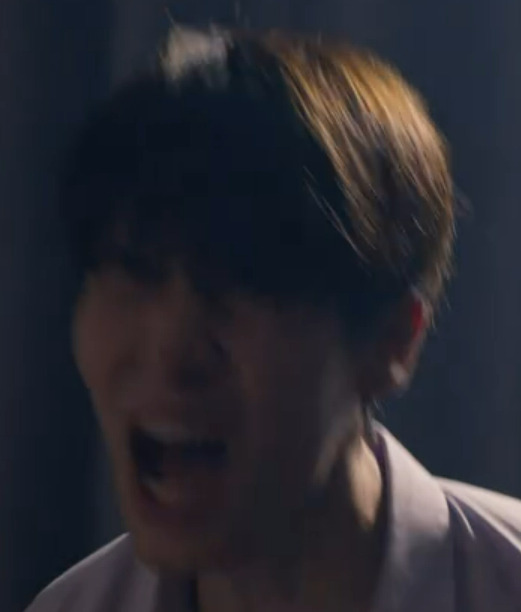
So he screams, at the top of his lungs, which is interesting. Because we do see Tee cry but not much. Tee's just not a person who cries. Which, besides being very relatable, is also terrible. Why? Because crying relieves you. It helps you cope, it releases the tension from you, at least a bit. Tee not crying here means this (Non dying), unlike the guilt of what happened before with him and the gang bullying Non

(something he is allowed to shed at least a single poetic tear about) Is a burden he can't be relieved of. At least, not at that moment.

So we watch as Tee screams helplessly. And the environment is so telling. GOD, I FUCKING LOVE THIS SHOW
There's an empty space. Virtually nothing is there with Tee. Because, of course, he's alone in the room, we know this, but he's also alone.
No one else knows this story like Tee does. No one else has been with Non when he was a creative student trying to make a film, when there was life to him in all senses of the word and also saw his dead, lifeless body. No one else has been the cause for both Non's problems and Non's death. No one has liked Non as a friend and cared for him and watched him die without being able to do anything about it. No one in Tee's life knows what he's going through, what it feels like. No one in Tee's life is able to share his grief. And he can't escape it either.
You see that weird ass mirror there? Why is it there? There are curtains around it. But it's not a window. That's odd. But while it makes no sense decoration/architectural-wise, it makes so much sense from the point of view of symbolism.
There's no escape. Even when it really feels like there should be. Because Tee, the guy with all the solutions, should be able to find a solution, shouldn't he? Besides... We come to care so much for him and for Non... So how come there's no solution? Because, we, like these teens do to adults, naively trust the narrative. Of course, there's no solution. We all knew this from the start. We're only here because of this: Non is dead.
So, instead of a way out, a hope for something better than what's going on in that room, we get just more of it. Tee and we alike, have no escape. We're both forced to face that scene, forced to accept it. And Tee, if he dares look for that way out, will only have to face himself.
But interestingly, he never does. Tee never looks at the mirror on the wall. He doesn't even acknowledge it. Which, of course, might be a reflection (pun intended) of how he tries to pass the blame of Non's death to his uncle.
He repeatedly claims he didn't know what would happen, that he wouldn't have brought Non back if he did but... Is that true? As Perth's character (BOMBASTIC SIDE EYE, btw) says:
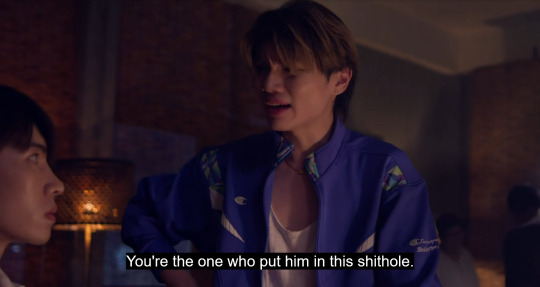
"You already knew, right?" Because, let's face it, it was obvious. Things could only go poorly for Non if Uncle Joe got his claws on him. Tee had to know that wouldn't end well.
So this scene also tells us that, despite deep down his immense amount of guilt telling him he is guilty of Non's death, Tee doesn't want to acknowledge it. He maintains that position, in fact, nearly all the way until the end of episode Ep.11. where he slightly changes his narrative.

He never planned to.
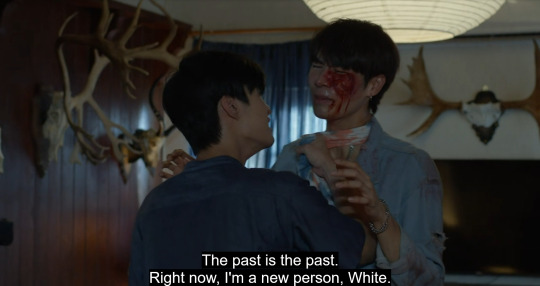
Right now, he's a new person. One that would not make the same mistakes as in the past but that, despite the changes, is inevitably the one who somewhere in the past did make them.
But back to the scene.
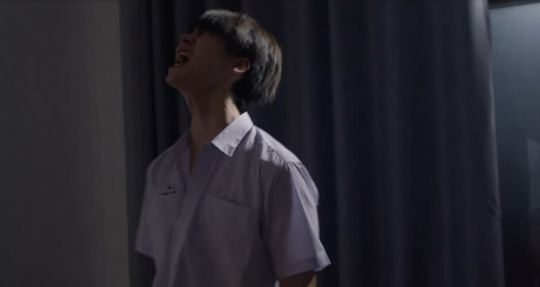
Tee is framed right in front of the blueish-grey curtains and we all know what that means, I do not need to cite the ancient scrolls. But I wanna add that grey is also:
a colour associated with sadness;
seen as a colour of death, as it is literally in greyscale, hence colourless, lifeless AND because it can also be interpreted as a mix of white and black, both of which are mourning clothes colours, depending on the culture;
a reflection of Tee's grey morality because, naturally, while we understand Tee's motivations and background, he did some pretty fucked up things that his good intentions and unhelpful help attempts cannot erase.
And then Tee finds a small paper, written by Non (in vivid blue, properly highlighting not only Non's depression but also Tee's).
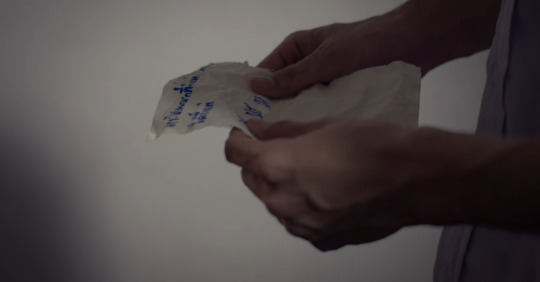
And the paper reads: "I'm gonna get out of this place. I'm not a loser." And it hits him even further because Non (at least in Tee's vision, I'll leave Non's death up for debate, I'm sure people will have theories) wanted so bad to be victorious once, to succeed just once. He wanted to get a chance to live normally and it didn't happen.
This, of course, ends up shaping Tee's own path, as he meets White and gets a chance to do things "right" and as he becomes this "new person" and gets away from his uncle. But, in that moment, none of that is relevant because it hasn't happened and Tee cannot know it will, he can only know, with written proof, that he failed. And now Non's dead.
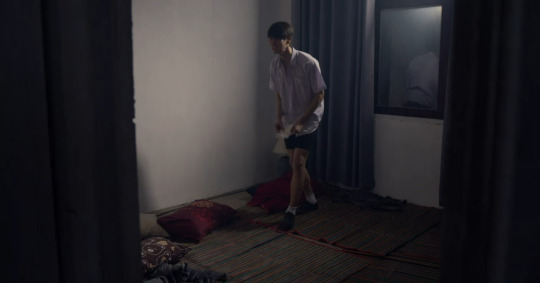
And so, in the last part of this scene, we see a more zoomed-out shot. And Tee's still alone but now we have a more clear vision of just how tiny that space is. And how he's nearly taller than the frame. How his grief is bigger than the space in which it was brought to him. But also how the weight of it, represented by the walls, is nearly crushing him. Another gigantic, and perhaps the biggest of all, responsibility on Tee's shoulders.
Furthermore, as @shannankle has marvellously described and explained in this post about sex scene framing, the framing gives us a level 3 visual gaze which is used to remind us as the audience of just how intimate and profoundly shaping of Tee this moment is: we are not supposed to be here, this moment is Tee's and Tee's alone. Because, of course, he is alone. In all senses. The access we're getting is nearly forbidden. Even to the other characters. Because they don't get to see it, they only hear about it (or we assume they do).
And, to top it all off, the cherry on top of this great scene: all of this happens while Tee is wearing his school uniform. Because, of course, it had to. Because we need to be reminded: this is a teenager. Tee, who's mourning his dead friend whose corpse he just saw and whose death is largely his fault is just a teenager.
#So yes#I might hate that Phee is apparently omniscient#but BY THE UNIVERSE AND ALL OF US IN IT#do I LOVE the care and thought put into the details of this story!!!#it's so good!!#dff#dff the series#dead friend forever the series#dead friend forever#dff meta#dead friend forever meta#dead friend forever ther series meta#dff the series meta#dff tee#tee dff#dead friend forever tee#tee dead friend forever#dff the series tee#tee dff the series
109 notes
·
View notes